News
Power Above Rights – China’s More Sinister Role in Africa
The West should shake itself out of its stupor in believing that African liberation movements support their values or even their interests. But African democrats should be even more concerned about China’s deliberate attempt to dilute and diminish their rights.

Director, The Brenthurst Foundation

Research Director, The Brenthurst Foundation

The setting up of a political training school in Tanzania by the Chinese Communist Party in collaboration with six of southern Africa’s liberation moments should be viewed with great concern, and not just by China’s external continental competitors.
The West, put simply, should catch a wake-up. And so should African democrats.
The Mwalimu Julius Nyerere Leadership School, supported by China’s Central Party School, has been established to provide ideological training and networking to cadres from six of the seven southern African liberation parties (Botswana is not included) which have remained in power since independence: the Popular Movement for the Liberation of Angola (MPLA), the Front for the Liberation of Mozambique (Frelimo), the South West African People’s Organisation (Swapo) of Namibia, Tanzania’s Chama Cha Mapinduzi (CCM, or Revolutionary Party), the African National Congress (ANC) in South Africa, and the Zimbabwe African National Union – Patriotic Front (Zanu-PF).
This concern about China’s role does not stem from Sinophobia. The new wave of Chinese interest in Africa since 2000 has brought much positive change, investing in business and building infrastructure, in so doing helping to change the perception of the continent as a problem to be solved to a business prospect.
But this has not been charity, and has come with clear strings and created leverage. The Chinese conditionality, to use a “Western” term, is not in this case better governance – perhaps the opposite in fact – but debt, lots of it.
Chinese lending to African countries has risen from $138.7-million to $170.1-billion over the past 20 years. In sub-Saharan Africa, China’s share of total external public debt rose from less than 2% in 2005 to nearly ten times that percentage in 2021. It’s a pretty useful lever to ensure African support for China per se, and its wider goals. And some of this infrastructure has been quite useless. Think of overly expensive airports and unnecessary stadiums, for instance.
But this is a deeply concerning political development and should cast doubt as to why these liberation movements originally sought office and the means employed to do so.
The six parties, all members of the Southern African Development Community (SADC), form part of the Former Liberation Movements of Southern Africa (FLMSA) coalition, a reincarnation of the Frontline States grouping which banded together to fight apartheid.
Back then, the Frontline States faced the common enemy of apartheid. These days they are united by less noble goals. They share a new common enemy: Opposition parties that dare challenge their hold on power and the sizeable rents that accrue to their elites through contracts and corruption.
FLMSA has been set up to monitor and analyse geostrategic trends, and domestic and global challenges to their rule, while generating plans to support one another.
The Nyerere Leadership School enables these six FLMSA parties to collaborate systematically through shared training at facilities gifted to them by the CCP’s Central Party School in Beijing through a $40-million donation.
This has not been made in the interests of democracy – to the contrary, given the historic tendency among five of the six, SA exempted, towards one-party rule, and since then, the consistent manner in which they have machinated to undermine constitutionalism and democratic electoral practice.
They not only share an open disdain for oppositions, but have stifled and interfered with democratic threats to their rule, including imprisoning and even assassinating opposition and troublesome civil society leaders.
Just ask Tanzania’s opposition stalwart Tundu Lissu, who remarkably survived being shot 16 times by, according to him, a wannabe state assassin. Now they are banding together to preserve their rule, no matter what their populations might prefer.
Africans prefer democracy
Two-thirds of Africans polled by Afrobarometer consistently prefer democracy to other forms of government, including 43% in South Africa, 47% of Angolans, 75% in Zimbabwe, 79% of Tanzanians, 49% Mozambicans and 55%% of those polled in Namibia. It generally seems the longer you have tasted one-party rule the more you appreciate democracy.
As Paul Nantulya, a Ugandan scholar of Chinese notes, the Mandarin term for this mutual help is weiwen, translated as “stability maintenance” or “regime survival” under CCP rule.
Even the most celebrationist Western enthusiast for the liberation movements would have to acknowledge that the trend is not in their interests. The 2017 FLMSA summit adopted a document, War with the West, which accuses former colonial powers and the US of seeking regime change through “colour revolutions”, financing opposition challengers and even coup plots. The summit concluded that a joint political school for ideology was needed to instil vigilance against such threats. It would provide “strong ideological grounding” for party cadres along with a series of “tough disciplinary measures” to be undertaken by sister parties.
As Nantulya, writing for the African Centre for Strategic Studies, concludes: “The CCP’s governance model is emerging as one of the manoeuvres being employed to rig multiparty systems to cling to power.”

Building on the legend of Tanzania’s post-colonial leader Mwalimu Julius Nyerere, the eponymous Leadership School is the first political school the CCP has built overseas. Political commissars from the CCP’s Central Party School in Beijing have been deployed to the school as instructors in forming a United Front (or tongyi zhanxian), a CCP strategy reportedly to mobilise support to advance the party’s interests and isolate its adversaries.
The CCP emblem is included in all the school’s official communications along with the insignia of the six FLMSA parties, while the CCP flag flies at its entrance. Ironically, despite Nyerere’s promotion of social justice and mediation through a culture of tolerance, the Nyerere Leadership School has a vastly different focus. At the June 2023 graduation attended by CCP and FLMSA leaders, Richard Kasesela, formerly a senior Tanzanian official, spoke about various upcoming SADC polls. “If we don’t win them, there will be no liberation movements to talk of. For now, we should help Zanu [Zimbabwe] win its elections. ANC [South Africa] and Swapo [Namibia] go for elections next year and CCM [Tanzania] in 2025. We need to put together plans to help each other win these elections.”
The first outside media outlets to report on the school wrote in an article for the Pulitzer Centre: “Behind the school’s closed doors, economics takes a back seat to political training. Chinese teachers sent from Beijing train African leaders that the ruling party should sit above the government and the courts and that fierce discipline within the party can ensure adherence to party ideology.”
The liberation movements once used the fight for rights for all as the means to legitimise their campaign for political power, and in contrast to delegitimise their opponents. Since then they have been openly willing to undermine or abrogate these rights to retain power even in the multiparty era.
However, as the Cambridge University Africa scholar Christopher Clapham observed at a Brenthurst Foundation conference about the history of liberation movements, the moment soon arrives when such a regime “is judged not by promises but by performance, and if it has merely entrenched itself in positions of privilege reminiscent of its ousted predecessor, that judgement is likely to be a harsh one.”
The west should shake itself out of its stupor in believing that African liberation movements support their values or even their interests, not least since the two are interlinked. But African democrats should be even more concerned about a deliberate attempt to dilute and diminish their rights.
To ensure a different and better outcome, a dedicated and tough struggle lies ahead.
This article originally appeared on the Daily Maverick
Photo: Daily Maverick

